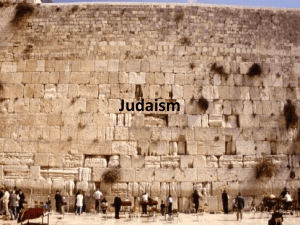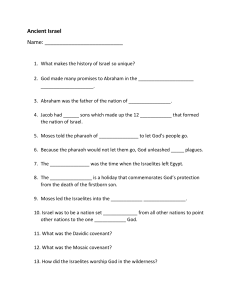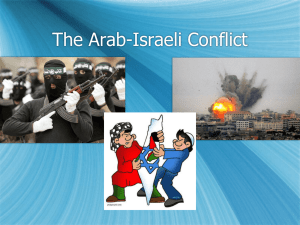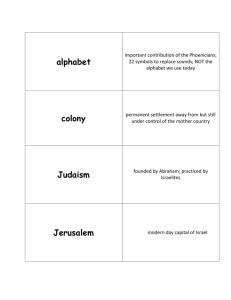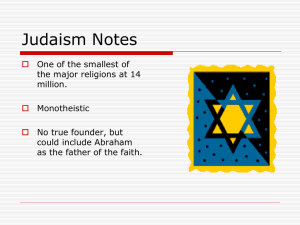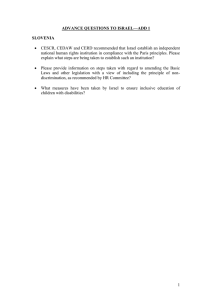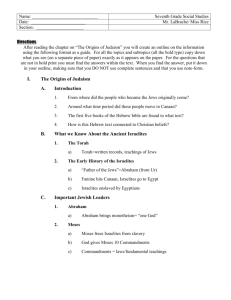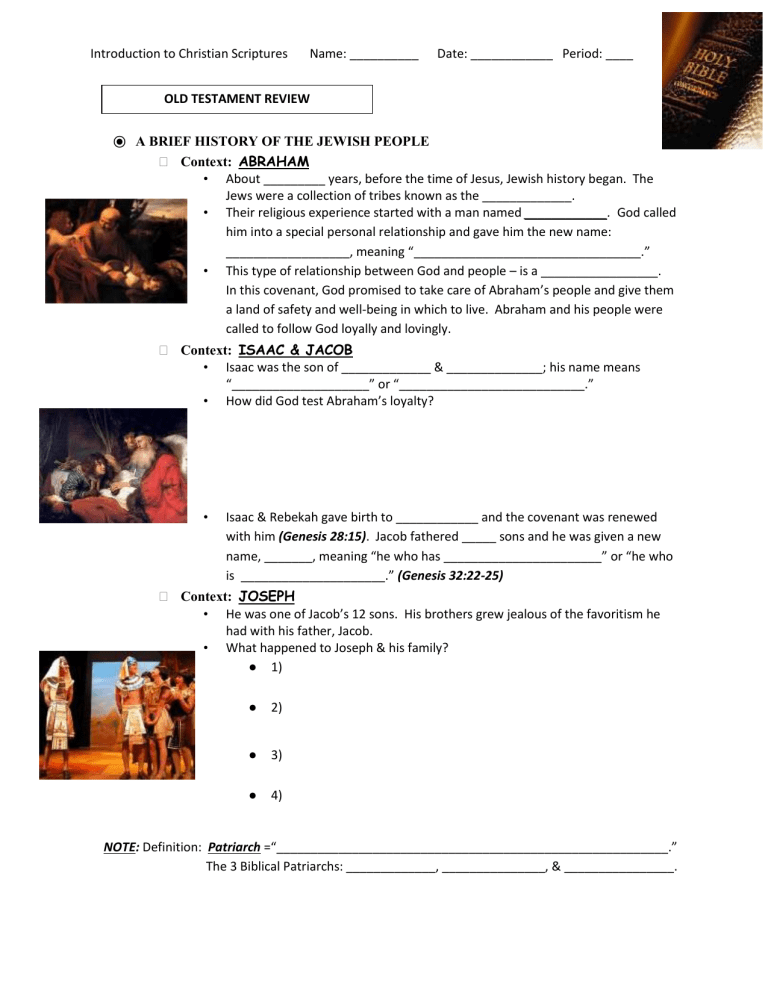
Introduction to Christian Scriptures Name: __________ Date: ____________ Period: ____ OLD TESTAMENT REVIEW ⦿ A BRIEF HISTORY OF THE JEWISH PEOPLE ◼ Context: ABRAHAM • About _________ years, before the time of Jesus, Jewish history began. The Jews were a collection of tribes known as the _____________. • Their religious experience started with a man named ____________. God called him into a special personal relationship and gave him the new name: __________________, meaning “_________________________________.” • This type of relationship between God and people – is a _________________. In this covenant, God promised to take care of Abraham’s people and give them a land of safety and well-being in which to live. Abraham and his people were called to follow God loyally and lovingly. ◼ Context: ISAAC & JACOB • Isaac was the son of _____________ & ______________; his name means “____________________” or “___________________________.” • How did God test Abraham’s loyalty? • Isaac & Rebekah gave birth to ____________ and the covenant was renewed with him (Genesis 28:15). Jacob fathered _____ sons and he was given a new name, _______, meaning “he who has _______________________” or “he who is _____________________.” (Genesis 32:22-25) ◼ Context: JOSEPH • He was one of Jacob’s 12 sons. His brothers grew jealous of the favoritism he had with his father, Jacob. • What happened to Joseph & his family? ● 1) ● 2) ● 3) ● 4) NOTE: Definition: Patriarch =“_________________________________________________________.” The 3 Biblical Patriarchs: _____________, _______________, & ________________. Introduction to Christian Scriptures Name: __________ Date: ____________ Period: ____ ◼ Context: MOSES • After ________ years of kind pharaohs, around _______ BC, the _______________ were dominated by pharaohs who enslaved them. They dreamed of one day being liberated. • __________ was called by God to free the Israelites from ________ in _______. • Exodus 3:13-15: God reveals His name to Moses: ● “____________” comes from the Hebrew verb “________” and it signifies that God is the ____________, Ruler of ______ & ________, and the “________________________________________________.” • Moses was sent by God to convince Pharaoh to free the Israelite people from bondage. Pharaoh was not easily persuaded. His hand was forced with a series of _______ plagues. • The 10th plague ultimately freed the Israelites from Pharaoh's grip. It caused the However, God gave the Israelites a sign that would protect them and them alone – from this disaster. What was that sign? (Exodus 12:14) ● 1) • • • ● 2) ● 3) Later as the first born children in all of Egypt were killed, God _____________ (the 1st Passover) the home on which the blood had been poured, saving the Israelites and convincing the Egyptians to free them. Yahweh called Moses to the top of Mt. Sinai. Read Exodus 19: 3-6 - As part of the covenant, the people had to follow the elaborate system of the Jewish Law, of which the cornerstone was the ___________________________________. At Sinai, the people of God were born with the special name _______. They roamed the desert _______ years due to their doubts and disbeliefs, yet God remained firm in God’s commitment to this covenant community. NOTE: The Law would one day be misused and would be a stumbling block between Jesus and his own people. But at this point in Jewish history, it was recognized for what it truly was – a wonderful gift that uniquely established a relationship of love between God and God’s people. ◼ Context: LIFE IN THE PROMISED LAND • After the death of Moses, the Israelites around 1250 B.C.E. crossed the _________________ into the land that had been promised to them by God: the Promised Land of _____________. • The next few hundred years consisted of endless turmoil for the Israelites as they sought to settle in a land already occupied by other people. During this Introduction to Christian Scriptures Name: __________ Date: ____________ Period: ____ time, ____________ i.e. great warriors were appointed to fight and defeat Israel’s enemies. As land was conquered, it was divided among the _____ tribes of Israel • Around 1050 B.C.E., Israel had a new enemy: ________________________. They captured the treasured _______________________ which housed the Ten Commandments. The Israelites needed a strong leader. Therefore, they appointed their first king, a man named ___________, around 1020 B.C.E. ◼ Context: KINGDOM OF ISRAEL • Around 1000 BC, Saul became king. ● King Saul: ⦿ 1) ⦿ 2) NOTE: During his reign, the 12 tribes of Israel were divided into 2 groups: A.) The _____________ who lived mostly north of Jerusalem kept the name __________ B.) The ____________ living to the south of Jerusalem went by the name _________ *Israel believed one of Saul’s sons should be his successor; whereas, the two southern tribes recognized David.* • King David: 1) ___________________________________________________. 2) ___________________________________________________. 3) ___________________________________________________. 4) ___________________________________________________. • King Solomon: 1) ___________________________________________________. 2) ___________________________________________________. 3) ___________________________________________________. 4) ___________________________________________________. Introduction to Christian Scriptures Name: __________ Date: ____________ Period: ____ OLD TESTAMENT REVIEW ⦿ A BRIEF HISTORY OF THE JEWISH PEOPLE ◼ Context: THE KINGDOM DIVIDED: ISRAEL & JUDAH • History of weak kings & religious Ddisgrace occurred • Great prophets called the people back to the covenant, yet the people continually weakened. ◼ Context: THE DEVASTATION OF THE KINGDOMS • Around ____________ B.C.E, the Northern Kingdom of Israel was destroyed by the Assyrians. (Read Isaiah 11:1-9) Details of the Prophecy • Around ______________ B.C.E., Jerusalem was overtaken by the ___________. In __________ B.C.E., the city and the Temple was destroyed and more captives were led off into the exile. Many of the people who were not captured settled in small colonies along the Mediterranean Sea. These settlers were part of the ________________ (__________) or (__________________________________) • The prophet ___________declared that the presence of God was still with the people and declared of future new covenant to be established. (Jer. 31:31-33) ◼ Context: THE RESTORATION • In ________ B.C.E., the ____________ overcame the Babylonians, and their leader allowed all of the exiles in the new empire to return to their native lands with freedom of worship. (Result of 2nd Isaiah Prophecy) Isaiah 53: 1-12 • After the Persians freed the Jews in Babylon, some began returning to their homeland, Judah. They rebuilt the _______________ in 515 B.C.E. No longer under the political nation united under a king but a religious community under a high priest. Consisted of the remnant; began being referred to as Jews under • Judaism = 2 classes of leaders developed: priests & scribes – ● (Responsible for offering sacrifices & teaching Law of Moses) ◼ Context: PERSIAN & HELLENISTIC RULE • In 538 BCE, _____________________ conquered Babylon and took over its empire. Cyrus issued a proclamation granting subjugated nations (including the people of Judah) religious freedom. According to the Hebrew Bible an estimated ____________ Judeans, led by Zerubabel returned to Judah and rebuilt the temple, 515 BCE. A second group of __________, led by ______ and _____________, returned to Judah in 456 BCE although non-Jews wrote to Cyrus to try to prevent their return. • In 333 BCE, _______________________ defeated Persia and conquered the region. He dominated the world, in particular, ____________, 300 years before the time of Jesus. He was born in Macedonia, a country north of Greece, yet he was a Greek in spirit educated by the great philosopher __________________. Introduction to Christian Scriptures Name: __________ Date: ____________ Period: ____ He believed the Greek vision of life offered civilization its greatest hope of fulfillment. He acquired kingship in Macedonia at20 years old. When he died in 323 BCE, he conquered much of the Mediterranean and lands as far east as India. • • • • • _________________ – After his death, his kingdom was divided. Palestine was divided between two of his generals. Even though they both were Greeks, they did not agree on many issues. These two men and their successors dominated Palestine for ___________ years (Seleucid Empire, Ptolemaic Egypt). For about 100 years after his death, the people of Israel were ruled by the power located in ____________ (________________ Empire). Israel influenced by Greeks from their language; yet Greek tolerance seldom interfered with the internal affairs of the Jews. In 198 BCE, the tolerance ended when all power shifted to the north ______________ Empire (_________________). The ________________ conquered the Syrian Greeks and demanded enormous amounts of money for their defeat; therefore, the Syrian Greek began heavily taxing the Jews. ______________: named used for the geographical setting in which the Gospel story takes place. Given to the region by the Greeks and derives from the Greek word for “Philistines,” the ancient rivals of Israel. Some Jewish leaders and the priestly class tried to build relationships with the Greeks; yet, another group called the _______________, “_____________________________,” resented the Greeks and believed that compromise with them amounted to the rejection of the Jewish faith. Note: The Syrian Greeks, angry about their defeat by the Romans, took out their rage on the rebelling Jews. They crushed the Jewish rebellion and desecrated the Beloved Temple, for example, by building an altar to the Greek god, Zeus in the Holy of Holies, the most sacred part of the temple. As a result, the ________________________ took place. (1 and 2 Maccabees). In ____________BCE, the sacred temple was rededicated after the defeat of the Greeks and the statue of Zeus was removed. This event is celebrated by Jews with the _________________ or ________________. By 142 BCE, the Greeks granted complete freedom to Israel; thus, beginning the century of freedom from foreign rule. ◼ Context: POLITICAL & GEOGRAPHICAL FACTIONS • Political Factions Within Judaism ____________: consisted of the priestly class; strictly dedicated to the Law of Moses. ____________: consisted of those people who withdrew from Jewish society to observe strict religious traditions. ____________: Gained a strong reputation for strict faithfulness to the Covenant; Refused to compromise strict religious beliefs; belief in afterlife; Messiah Introduction to Christian Scriptures • Name: __________ Date: ____________ Period: ____ Geographical Factions in Palestine ● __________: Region of central Palestine; settled by the faithful remnant who had returned from the exile in the 6th century B.C.E., Religious & Geographic Center of Judaism. ● __________: South of Judea; quickly absorbed by Israel and forced to accept Judaism ● __________: North of Judea; Samaritans were the descendants of the old northern tribes of the kingdom of Israel; Tension and hatred existed between the Samaritans and the faithful remnant i.e. the southern Jews. (Luke 10: 29-37; John 4: 1-30) ● __________: 2nd class citizens because of their late acceptance of the Jewish faith ◼ Context: APPEAL TO ROME • The century of independence under Jewish leaders quickly deteriorated. Before civil war, the Pharisees and Sadducees appealed to Rome for help in settling conflicts; yet, in 63 BCE, some 60 years before the birth of Jesus, the _______________ occupied Palestine and took complete control. • By 37 BCE, the Romans selected an Idumean Jew named __________ to rule Israel. He ruled until 4 BCE, towards the end of his reign, Jesus was born. • ________________ – Master Builder; Began Restoring the Temple; Cruel Man; Slaughter of the Innocents (Matt. 2:13-18). His son, ____________________ succeeded him. He was given control of the northeast region of Palestine. He beheaded __________________. (Matthew 14:3-12). The 3rd son of Herod the Great was the worst leader of the three. • The Romans eventually appointed a _______________. _________________, the 5th procurator began his rule in the year 26 AD. He played a key role in the trial and execution of Jesus. ◼ Context: THE DESTRUCTION OF JERUSALEM • Anti-Roman feelings among the Jews built to the point of exploding, fueled by the memory of the Maccabean Revolt, under the leadership of a revolutionary group known as the ______________, an open rebellion against the Romans began in ______ CE. Yet, the Romans crushed the rebels and destroyed Jerusalem and its temple by the year 70 AD. Because of the strength of the Pharisees was Judaism able to survive and become the major world religion it is today.

